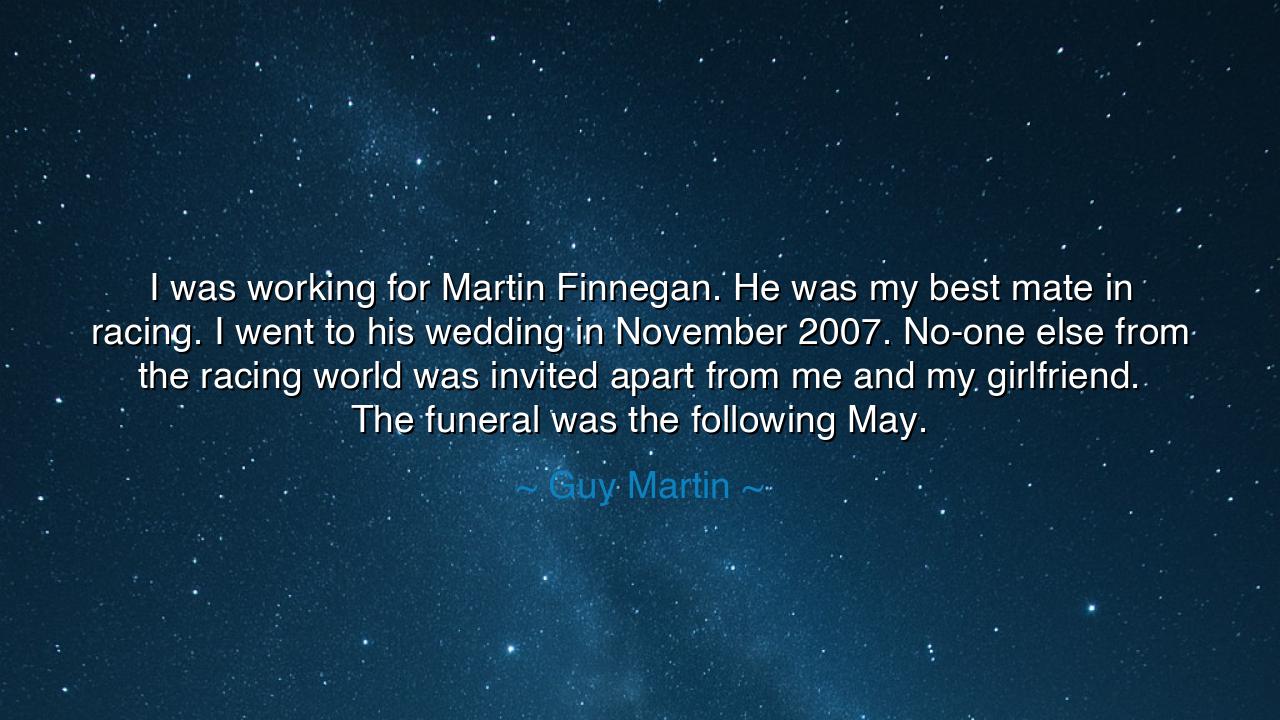
I was working for Martin Finnegan. He was my best mate in
I was working for Martin Finnegan. He was my best mate in racing. I went to his wedding in November 2007. No-one else from the racing world was invited apart from me and my girlfriend. The funeral was the following May.






In these sorrowful yet profound words, Guy Martin reflects upon the fleeting nature of life, friendship, and the stark contrast between joy and grief. He speaks of his bond with Martin Finnegan, a fellow racer and his dearest companion in a dangerous world. To be the sole racing friend invited to Finnegan’s wedding was a mark of deep trust and closeness, a moment of celebration and love. Yet, in a cruel twist of fate, that joy was followed only months later by loss, when Martin attended his friend’s funeral. This quote captures the fragile thread upon which human existence hangs, reminding us that triumph and tragedy often walk side by side.
The origin of this reflection lies in the perilous realm of motorcycle racing, where speed and risk are constant companions. Martin and Finnegan lived as modern warriors, challenging the limits of man and machine. In this world, victory is exhilarating, but danger is ever-present, lurking in every corner and turn. Guy Martin’s words are not only about one man’s death, but about the heavy cost borne by those who chase greatness. They remind us that in lives lived at the edge, the line between celebration and mourning can be crossed in a single heartbeat.
History holds countless parallels to this tale of sudden loss. Consider the ancient Spartans, who feasted and rejoiced before going to battle, knowing that some among them would not return. A wedding feast in Sparta might be followed by the wails of mourning only days later. The story of Finnegan and Martin echoes this ancient rhythm: joy and sorrow intertwined, as inevitable as the rise and fall of the sun. Just as the warriors of old accepted their fate with courage, so too must modern champions face the truth that every victory carries a shadow.
The quote also speaks to the sacredness of memory and the bonds between friends. Though Martin Finnegan’s life was cut short, his friendship left a lasting mark on Guy Martin’s soul. This mirrors the ancient belief that a person lives on through the stories told about them. In Norse tradition, a fallen warrior enters Valhalla, remembered in song and story by those who survive. By speaking Finnegan’s name, by recalling the contrast between his wedding and his funeral, Guy Martin ensures his friend’s spirit is not lost to time.
Ultimately, these words are a lesson about impermanence and gratitude. They remind us to treasure moments of joy, for we cannot know when the tide of fate will turn. Just as a racer must focus fully on each second of the race, so too must we live each day with presence and love. Let this teaching endure: celebrate your companions while they walk beside you, for one day you may stand alone, holding only the memory of their laughter. Through remembrance and honor, we give meaning to both the wedding and the funeral, binding life and death into a single, eternal story.






LNThao Ly Nguyen
Guy Martin’s experience brings to light the emotional rollercoaster of life in a high-risk field. It’s jarring to think about the sharp contrast between a wedding celebration and the grief of a funeral so soon after. How does such loss shape a person’s perspective on their career or friendships? Does the racing world have a unique way of processing tragedy, or do the intense emotions of both celebration and mourning run deeper in such environments?
TDnguyen bui trung dung
What struck me about Guy Martin’s quote is how quickly life can shift from joy to sorrow, especially in such a close-knit community like the racing world. It makes me wonder how the racing community deals with loss—do the bonds formed in the sport help people cope, or does the constant reminder of danger create an underlying anxiety? How do people in such high-risk careers maintain a sense of normalcy when faced with such unpredictable events?
KNKhanh Ngoc
The contrast between a wedding and a funeral in Guy Martin’s story speaks to how fragile life can be, especially in high-stakes environments like racing. But how does one process the emotions of celebrating a friend’s new beginning, only to mourn their abrupt end shortly after? Does this change how we approach relationships or careers where risk and mortality are a constant factor? It’s a deep reflection on the unexpectedness of life.
VTVu Tram
This quote really highlights the depth of friendship and the unpredictability of life. Going from celebrating a wedding to mourning a funeral in such a short span is heartbreaking. It makes me think, how often do we take the time to appreciate those we hold dear, especially knowing that life can take such unexpected turns? How do people cope with the sudden loss of someone they were so close to, especially in a world as intense as racing?
TLTuong Le
Guy Martin’s reflection is both poignant and striking. The contrast between attending a wedding and then a funeral just months later makes me wonder how life in the racing world is so tightly knit, yet so fragile. It also raises the question: how much can we truly predict about the people we become close to? Life can change so drastically in such a short time—what does this say about the unpredictable nature of relationships in high-risk professions?